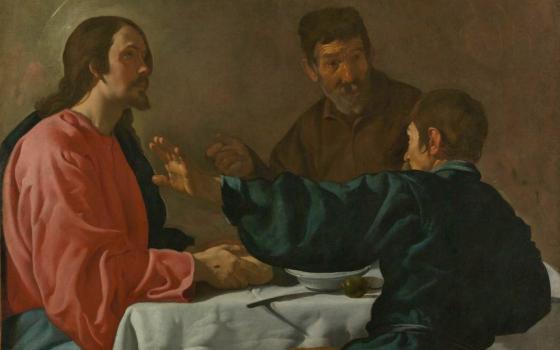I always love the Scripture readings during the first week of Easter, when the church prays with the appearance stories of the resurrected Jesus. What I especially appreciate is the human reality. Those who knew and loved Jesus most closely were unable to see, believe or fully appreciate the power of his transformation, right before their very eyes. I wonder … if Jesus appeared today or tomorrow, physically or metaphysically, would I recognize my love?
Take the two on the road to Emmaus in Luke's Gospel. When Jesus caught up with them on the road, they did not recognize him. Instead they treated him like someone who'd been living in a cave for a few weeks. Why, he didn't even know all that had happened to their friend who had been sentenced to death. The pair shared an even more unbelievable story — some women from their group claimed that when they'd gone to the tomb that morning, the body of Jesus was gone! What's more, the women said some angels told them that Jesus was not dead but alive after all. How crazy was that?
It was not until the simple reenactment of the moment that Jesus had memorialized just a few nights earlier — the breaking, blessing and sharing of the bread — that they finally recognized him. Their eyes and hearts were opened by this valuable encounter of sharing.
John's Gospel, of course, paints that beautiful moment when Mary Magdalene finally recognizes her friend and teacher in his risen form. John sets the stage. There she is, weeping at the empty tomb, worried that someone has stolen the body of her dear one. What else could explain his disappearance? She sees Jesus, but her perspective is clouded by grief and worry. She thinks he's the gardener who has stolen the body of her friend. It is only when Jesus speaks her name, expressing the deep value of their personal relationship, that she recognizes him and is able to accept his command to spread the good news to the other disciples.
Then of course there is Thomas, the doubtful one long remembered by history, who just could not accept the testimony of his friends that Jesus had appeared to them. In fact, Jesus could stand right in front of him, and unless he could personally touch those places where Jesus was wounded during his execution, he would refuse to believe. Thomas placed a higher value on his own sense and senses, higher than the word of his friends or even the power of God.
I suppose I love these stories so much because they are so very human. Sometimes when I am disillusioned by an experience of distrust (whether on the receiving or withholding end), I remember that this is part of the human condition. When my faith is shaken or hard to find in the face of the suffering that abounds, I am comforted by those travelers on the road to Emmaus. It took them a while to understand that the power and hope of transformation and blessings shared point to something larger than our problems, no matter how small or not-so-small they may be. When I am seduced by the sheer power of impossibility, I remember Thomas, who despite himself was surprised and came to believe that which he thought impossible.
As I've prayed with these readings this Easter, I've been struck by the common threads of values and perspective. Our perspective can be clouded by our presumptions of other people's values — think red state versus blue state or anti-immigrant rhetoric. Our vision can be clouded by our attitude: despair, exhaustion or even simply lack of bandwidth. We see what we expect, which sometimes is not the best, or even worse; we fail to see the face of Christ in the other.
During this season of hope and promise, I've been praying for wisdom. In particular, I've prayed for insight into how to engage our increasingly polarized public discourse and its real-life consequences, especially for those who are poor or living on the margins. The polarization is not only in our nation, but sadly even in our church.
How might the resurrected Jesus be calling us to open our hearts and eyes to the values we share?
My reflection has led me to ponder my own experience with the Nuns on the Bus outside the 2016 Republican Convention in Cleveland. Under the guidance and inspiration of Sr. Simone Campbell, our cohort of sisters and colleagues towed a lemonade cart around and asked folks a series of questions: Who in your family is it difficult to discuss politics with and why? What worries you about this election? What gives you hope for our nation?
We did not engage in conversation, but rather received their responses, which in my case sometimes meant biting my tongue. Some of the answers were to be expected. Some were eerily prescient of the sound bites that would later become the norm on certain cable news shows. And others stopped me in my tracks for their surprising human qualities.
This was especially true with the third question — What gives you hope for our nation? This is a values-based question, one that defies practiced scripts and narratives. As such, it led to the most thoughtful answers. Multiple people paused, looked up at the sky or down at the ground or right into my eyes, and spoke of common values. They highlighted the values of our families, the promise of young people and the dreams of our founders.
I came away convinced that the path forward through the mess of our own making is to clear our perspective through conversation about shared values. As one man from Wisconsin told me, "It can be scary, but over time our country will heal based on our strong values."
Who am I called to walk with on the road to healing? What is clouding my perspective and preventing me from seeing Christ in those with whom I disagree? How might I help to bridge the divide and make the collective leap from impossibility to the promise of the Resurrection, recognizing that we humans have a habit of making things complicated, but that for God, all things are possible.
[Susan Rose Francois is a member of the Congregation Leadership Team for the Sisters of St. Joseph of Peace. She was a Bernardin scholar at Catholic Theological Union and has ministered as a justice educator and advocate. Read more of her work on her blog, At the Corner of Susan and St. Joseph.]

